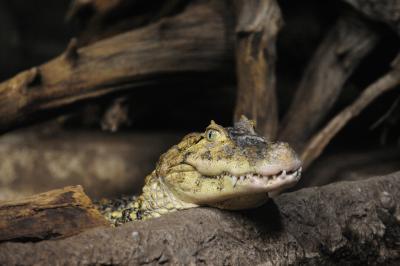The Wildlife Conservation Society and other organizations released a new study recommending a disease screening program for farm-raised caiman in ranching facilities in Argentina to ensure the safety of people and wildlife alike.
The recommendations focus on two crocodilian species, the yacare caiman and broad-snouted caiman, both of which are reared in caiman ranches for sustainable harvest. The research team sought to assess the presence of potentially harmful bacteria in captive-raised caiman at a typical ranching facility in Argentina's Chaco region, where several facilities are currently in operation.
Crocodilian ranching programs are based on wild-harvested eggs and the release of excess hatchlings into the wild.
The study appears in the current edition of The Journal of Wildlife Diseases. The authors include: Marcela Uhart and Hebe Ferreyra of the Wildlife Conservation Society; Rosana Mattiello of the Universidad Nacional de Buenos Aires; María Inés Caffer and Raquel Terragno of the Instituto Nacional de Enfermedades Infecciosas, Administración Nacional de Laboratorios e Institutos de Salud; Adrianna Schettino of the Universidad Nacional del Centro de la Provincia de Buenos Aires; and Walter Prado of the Refugio de Vida Silvestre El Cachapé and the Fundación Vida Silvestre Argentina.
Between 2001 and 2005, the research team collected samples from more than 100 captive caiman at a ranching facility in the Argentinian Chaco region for the purpose of testing for Salmonella, a common bacteria in reptiles that can be harmful and occasionally deadly in animals and humans. During the survey, researchers found two species of Salmonella, both of which are known to cause disease in humans. Further, in one of the survey years (2002) Salmonella were present in 77 percent of samples collected, suggesting this was not an isolated finding. Since some of the hatchlings are returned to the wild, the chances of releasing infected caiman shedding this bacteria can be high.

The Wildlife Conservation Society and other organizations released a new study recommending a disease screening program for farm-raised caiman (including broad-snouted caiman) in ranching facilities in Argentina to ensure the safety of people and wildlife alike.
(Photo Credit: Julie Larsen Maher/Wildlife Conservation Society)
"An accidental introduction of Salmonella or other pathogens into the environment during the release of captive-raised caimans could pose a health threat to wild caiman populations and other susceptible wildlife species, including some birds and mammals," said Dr. Marcela Uhart of WCS's Global Health Program and lead author on the study. "Preventive measures to detect the presence of harmful pathogens in caiman ranching facilities can help reduce potential health risks to humans as well as protect wild animal populations."
Caiman ranching facilities in Argentina currently raise more than 100,000 individual reptiles every year, all of which derive from eggs collected in the wild. Approximately 10 percent of all caimans raised in the facilities are returned to the wild; the rest are used for the commercial production of caiman hides for leather products and meat for local consumption. At present, there is no standardized health surveillance system for Argentina's ranching operations.
"Caimans almost became extinct in the late 1960s as a result of over-hunting for their hides," said Dr. Robert A. Cook, Executive Vice President and General Director of WCS's Living Institutions. "Today, the International Union for Conservation of Nature (IUCN) supports caiman ranches as a tool for crocodilian conservation. A health monitoring system would help ensure the sustainability of both reintroduction and commercial aspects of caiman ranching as well as the safety of products for human usage."
Dr. Uhart added: "We owe a debt of gratitude to both the owners of El Cachape ranch and Fundación Vida Silvestre Argentina for initiating the health assessment. The study highlights the potential for conservation-economic partnerships on private lands as well as the way responsible caiman ranching should be done."
Source: Wildlife Conservation Society